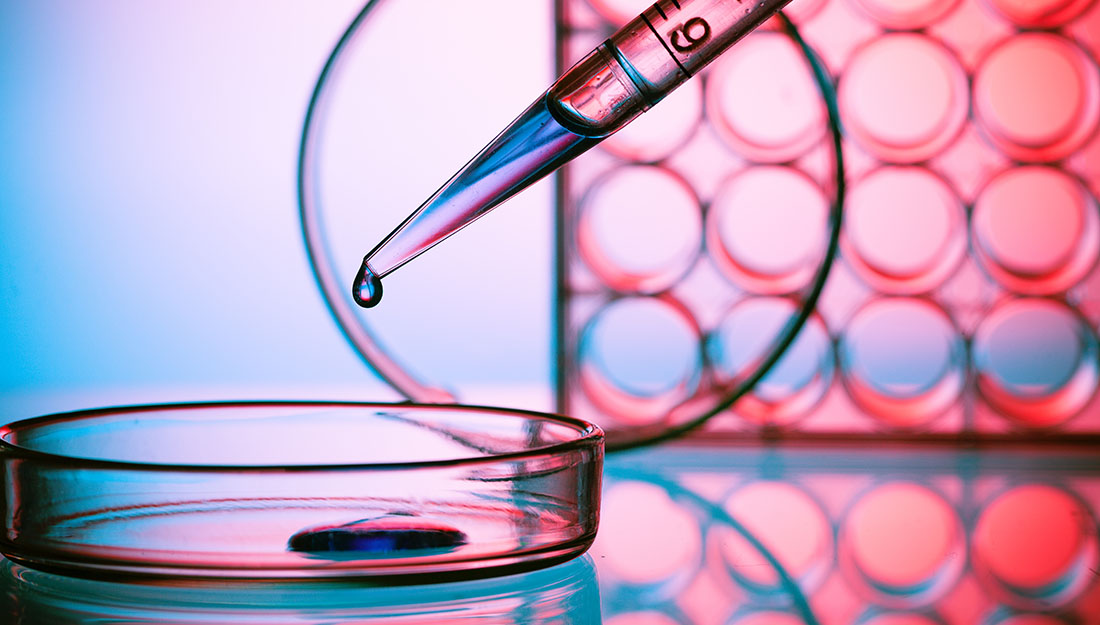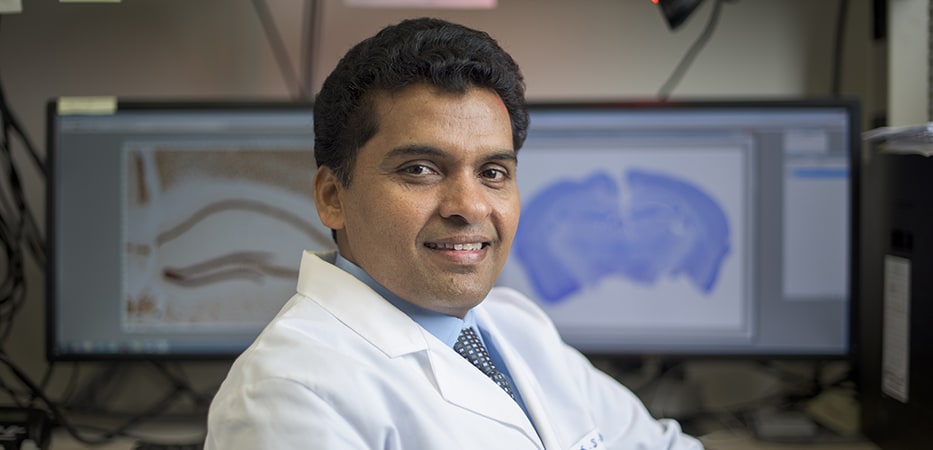College of Medicine researchers awarded funding for 13 projects

The Texas A&M College of Medicine was recently awarded funding from Texas A&M University for 13 different research projects under the T3, Texas A&M Triads for Transformation, program.
The T3 program is a multidisciplinary seed-grant program that funds 100 research projects at a total of $30,000 each. T3 fosters new research and scholarship by moving vision to proof-of-concept, and the grants given will allow each project to develop long-term research and scholarship collaborations.
The program is designed to further Texas A&M’s commitments to the three pillars by advancing transformational learning and enhancing discovery and innovation throughout the community, in Texas and in the United States.
The 13 research proposals that College of Medicine faculty members will be working on include:
Basic Mechanisms that Promote Tumor Growth and Spreading
Kayla J Bayless, PhD, associate professor in the Department of Molecular and Cellular Medicine, and Robin Fuchs-Young, PhD, professor in the Department of Molecular and Cellular Medicine
Tumors grow and spread throughout the body when chemotherapy and radiation are unsuccessful in treating cancer. Cell invasion in a 3D environment is a common biological process that is required for blood vessel growth, lymphatic vessel growth and tumor cell spreading. This project analyzes key cell types that are responsible for blood vessel, lymphatic vessel and tumor cell invasion, which will help allow scientists to identify the targets that slow and can prevent tumors from progressing.
A Novel Intervention for Worry
Israel Liberzon, MD, professor and head of the Department of Psychiatry and Behavioral Sciences
Many individuals perceive that worrying can lead to positive outcomes because bad things won’t happen as often, but individuals who engage in this cycle will be more likely to worry in the future and are essentially rewarded for worrying. This project proposes a novel treatment for worrying, in which patients will be asked to engage in rewarding experiences every time they feel the need to worry, which they hope will help to break the cycle where worry predicts a positive outcome.
Stimuli-Sensitive Manipulation of Tumor-Associated Macrophages for Tumor Targeting and Therapy
Fei Liu, PhD, associate professor in the Department of Molecular and Cellular Medicine
The infiltration of tumor-associated macrophages (TAMs) is highly correlated with tumor growth, invasion and metastasis. This project proposes to design novel matrix metalloproteinase 2 (MMP2)-sensitive nanocarriers in order to target tumor-specific macrophages and TAM-centered anticancer immunotherapy.
Mesenteric Lymphatic Response to Ionizing Radiation
Mariappan Muthuchamy, PhD, professor in the Department of Medical Physiology
Radiation enteropathy ultimately helps determine the maximum effective dose of treatment for cancer patients. There are no current effective approaches for preventing acute radiation injury. The purpose of this project is to determine the effects of radiotherapy on the mesenteric lymphatic system, which could lead to significantly improving both survival and quality of life for cancer patients.
Innate Immune Responses in Macrophages Infected with Both Virulent and Avirulent Rhodococcus Equi
Kristin Patrick, PhD, assistant professor in the Department of Microbial Pathogenesis and Immunology, and Robert O Watson, PhD, MPH, assistant professor in the Department of Microbial Pathogenesis and Immunology
Rhodococcus equi is an intracellular bacterium that causes pyogranulomatous pneumonia in immunocompromised animals and humans, all while infecting, replicating and surviving inside macrophages. This research project tests how immune responses affect R. equi and how R. equi is sensed by macrophages to enable its survival.
Brain-On-A-Chip: Spio-Au-Mofs Decorated 3D Scaffolds for Brain Tissue Regeneration
Allison C. Rice-Ficht, PhD, senior associate vice president for research
A collaborative group including faculty in Mechanical Engineering and Biochemistry and Biophysics, along with Allison Rice-Ficht, PhD, Molecular and Cellular Medicine, have proposed a method to support regeneration of brain tissue. The goal of this research project is to develop a 3D printed scaffold decorated with core-shell SPIO-Au nanoparticle encapsulated metal organic frameworks (SPIO-Au-MOF). The framework will serve as a microenvironment to support cell-based therapies for neurodegenerative disease.
Single-Cell Transcriptomics of Terminal Schwann Cells at the Vertebrate Neuromuscular Junction
Mendell Rimer, PhD, associate professor in the Department of Neuroscience and Experimental Therapeutics, and Ursula Winzer-Serhan, PhD, associate professor in the Department of Neuroscience and Experimental Therapeutics
The breakdown of the structure and function of a nerve-muscle synapse, the connection between a motor neuron and skeletal muscle fiber, is important in neuromuscular diseases. This project aims to recognize unique genes present in terminal Schwann cells, which are essential to maintain the integrity of the nerve-muscle synapse, at the mammalian neuromuscular junction.
Renal Lymphatic Endothelium in Kidney Inflammation
Joseph M Rutkowski, PhD, assistant professor in the Department of Medical Physiology, and Brett M Mitchell, PhD, FAHA, associate professor in the Department of Medical Physiology
A hallmark of inflammation is lymphangiogenesis (LAG): the growth and expansion of the lymphatic vasculature. Studies targeting LAG have demonstrated that LAG is necessary to resolve inflammation. This project proposes to identify how renal lymphatics change their molecular expression during hypertension, acute kidney injury, Alport syndrome and chronic kidney disease to identify the mechanisms by which LAG regulates inflammation.
Bio-Instructive Microporous Hydrogels for Tissue Repair and Regeneration
Jianxun Jim Song, PhD, professor in the Department of Microbial Pathogenesis & Immunology
Traumatic injuries to the spinal cord can be crippling to a person’s life, and there are no current therapies that efficiently regenerate spinal cord lesions. This project addresses this problem by investigating microporous annealed particle (MAP) hydrogels as a therapy/treatment for spinal cord regeneration.
Gene Therapies for Griscelli Syndrome Type 1
Rahul Srinivasan, PhD, assistant professor in the Department of Neuroscience & Experimental Therapeutics
Griscelli syndrome (GS) Type I is an ultra-rare autosomal recessive disease characterized by neurological deficits such as severe mental retardation, seizures, ophthalmological complications, hypotonia and a dramatically shortened life span. There is currently no cure for GS1 and there is minimal-to-no research being performed to identify a treatment for it. This research proposal seeks to raise awareness for GS1 by developing and testing gene therapies at the pre-clinical level.
Identification of Borrelia Burgdorferi Protective Epitopes
David W Threadgill, PhD, university distinguished professor in the Department of Molecular and Cellular Medicine
Lyme disease (LD), one of the most prevalent tick-borne illnesses in the United States, is caused by Borrelia burgdorferi (Bb). There is no current vaccine to prevent the initial infection from Bb. This research project identifies epitopes that can be possibly used as vaccine candidates for LD.
Defining Active, Relaxed, and Closed States of Thick Filaments in Sarcomeres
Carl W Tong, MD, PhD, FACC, associate professor in the Department of Medical Physiology
The heart can contract and relax under a widespread range of gradations, and being able to control the gradation allows the heart to increase its pumping capacity to meet certain physiological needs. This project will develop a new method to understand the mechanisms that cause heart failure by characterizing thick filament within intact sarcomeres—the basic contractile unit of the heart.
Cell Stiffness in Vascular Disease
Andreea Trache, PhD, associate professor in the Department of Medical Physiology
Numerous studies show that arterial stiffness is directly related to vascular diseases, such as hypertension and atherosclerosis, but the mechanisms underlying cellular stiffness and its contribution to tissue stiffness is still not well understood. This proposal studies vascular smooth muscle cell stiffness as an important contributor to the arterial stiffness in vascular disease and aging.
Media contact: media@tamu.edu


